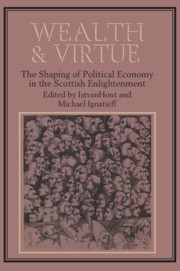Book contents
- Frontmatter
- Contents
- Preface
- List of abbreviations
- 1 Needs and justice in the Wealth of Nations: an introductory essay
- 2 Where had the Scottish economy got to by the third quarter of the eighteenth century?
- 3 Gershom Carmichael and the natural jurisprudence tradition in eighteenth-century Scotland
- 4 The Scottish professoriate and the polite academy, 1720–46
- 5 From applied theology to social analysis: the break between John Locke and the Scottish Enlightenment
- 6 The Scottish Enlightenment at the limits of the civic tradition
- 7 Adam Smith as civic moralist
- 8 The legal needs of a commercial society: the jurisprudence of Lord Kames
- 9 Cambridge paradigms and Scotch philosophers: a study of the relations between the civic humanist and the civil jurisprudential interpretation of eighteenth-century social thought
- 10 Adam Smith's ‘enduring particular result’: a political and cosmopolitan perspective
- 11 The ‘rich country–poor country’ debate in Scottish classical political economy
- 12 John Millar and individualism
- 13 Scottish echoes in eighteenth-century Italy
- Index
6 - The Scottish Enlightenment at the limits of the civic tradition
Published online by Cambridge University Press: 05 June 2012
- Frontmatter
- Contents
- Preface
- List of abbreviations
- 1 Needs and justice in the Wealth of Nations: an introductory essay
- 2 Where had the Scottish economy got to by the third quarter of the eighteenth century?
- 3 Gershom Carmichael and the natural jurisprudence tradition in eighteenth-century Scotland
- 4 The Scottish professoriate and the polite academy, 1720–46
- 5 From applied theology to social analysis: the break between John Locke and the Scottish Enlightenment
- 6 The Scottish Enlightenment at the limits of the civic tradition
- 7 Adam Smith as civic moralist
- 8 The legal needs of a commercial society: the jurisprudence of Lord Kames
- 9 Cambridge paradigms and Scotch philosophers: a study of the relations between the civic humanist and the civil jurisprudential interpretation of eighteenth-century social thought
- 10 Adam Smith's ‘enduring particular result’: a political and cosmopolitan perspective
- 11 The ‘rich country–poor country’ debate in Scottish classical political economy
- 12 John Millar and individualism
- 13 Scottish echoes in eighteenth-century Italy
- Index
Summary
Few societies have experienced more acutely the problem of a conflict between established political institutions and the demands of economic development than eighteenth-century Scotland; few thinkers have reflected on that problem as thoroughly as those of the Scottish Enlightenment. In 1707 Scotland effectively faced a choice: either the nation preserved its existing political institutions at the cost of severely restricting its economic opportunities, or it yielded up its institutional independence and accepted union with England in return for free trade across the border and access to the English commercial empire. Whatever the motives of the politicians immediately responsible for the Union, there is no doubt that Scotsmen were aware of the significance of the decision then taken. For some ten years before 1707 the critical economic and political condition of the country had been the subject of intense public debate; and from this had emerged widespread agreement that the root of the crisis lay in the failure of Scotland's political institutions – its parliament above all – to generate economic improvement.
Within half a century of the Union, what had then been discussed as a problem for Scotland in particular is to be found at the centre of the Scottish Enlightenment's inquiry into ‘the progress of society’ in general.
- Type
- Chapter
- Information
- Wealth and VirtueThe Shaping of Political Economy in the Scottish Enlightenment, pp. 137 - 178Publisher: Cambridge University PressPrint publication year: 1983
- 27
- Cited by

